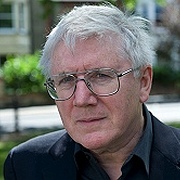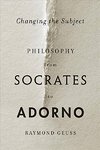Raymond Geuss
Autore di L'idea di una teoria critica: Habermas e la Scuola di Francoforte
Sull'Autore
Raymond Geuss is Reader in Philosophy at the University of Cambridge.
Fonte dell'immagine: University of Cambridge
Opere di Raymond Geuss
Nicht wie ein Liberaler denken 1 copia
Opere correlate
What Happened in and to Moral Philosophy in the Twentieth Century?: Philosophical Essays in Honor of Alasdair MacIntyre (2013) — Collaboratore — 11 copie
The Hera of Zeus: Intimate Enemy, Ultimate Spouse (Classical Scholarship in Translation) (2016) — Traduttore, alcune edizioni — 3 copie
Etichette
Informazioni generali
- Data di nascita
- 1946
- Sesso
- male
- Nazionalità
- USA
- Istruzione
- Columbia University (Ph.D., Philosophy)
- Attività lavorative
- Professor of Philosophy, Cambridge University (emeritus)
- Organizzazioni
- University of Cambridge
Utenti
Recensioni
Potrebbero anche piacerti
Autori correlati
Statistiche
- Opere
- 20
- Opere correlate
- 5
- Utenti
- 666
- Popolarità
- #37,863
- Voto
- 3.9
- Recensioni
- 9
- ISBN
- 49
- Lingue
- 3
- Preferito da
- 2















The bogeyman of critical theorists is the positivist of the Vienna Circle. In the positivist's view critical theories are at best a mix of empirical claims and moral judgments, exceeding the bounds of science proper. The Frankfurt School wants to combat the positivist's view and vindicate critical theory as a distinctive and legitimate form of knowledge, showing up the too-narrow epistemology of the positivist.
Geuss reviews different ways this vindication could be pulled off, and it's not easy. He focuses on the centerpiece of Marxist critical theory, its criticism of ideology (Ideologiekritik). A successful criticism of ideology is one that frees agents from the grip of their society's false ideology -- making it both emancipatory and enlightening, as good critical theories must be.
What makes this tricky is that positivism could, in principle, be quite accommodating, making space for objectifying theories that would show an ideology to be false for many interesting senses of "false": false because illegitimately presenting as objective what is in fact socially contingent; false because self-fulfilling in a way that depends on agents not appreciating its nature; etc. Geuss considers what a critical theory *must* be if it can show up positivism with a distinctive kind of knowledge.
He argues that Juergen Habermas's criticism of ideology has what it takes to be a critical theory imparting a kind of knowledge that positivists would deny is possible: it can condemn an ideology as "false" in a sense that positivism could not, and it can do so in a way that enlightens and emancipates agents who hold it. In abbreviated form, Geuss summarizes Habermas's criticism of ideology like this: "For Habermas, ideology is fundamentally false consciousness [...], but the 'falsity' in question is 'reflective unacceptability,' and to say of a form of consciousness that it is reflectively unacceptable is to [say] that it could only have been acquired under conditions of coercion."
For an hour or so this morning I felt I was tracking how criticism of ideology like this could be a valid form of knowledge that, like a butterfly, manages to elude the positivist's empirical net. Just as I write this, I'm unsure again. The maneuver that saves it from restatement in purely empirical terms may be the deduction from "could only have been acquired under conditions of coercion" to "reflectively unacceptable" and then to "false"--? There is a transcendental argument vibe, and Geuss points out this is distinctive to Habermas; other critical theorists do not formulate their criticism of ideology quite that way.
For me this was a valuable short book. My encounters with critical theory in the past have been frustrating, but Geuss is a very clear writer if you like the analytical style -- and of course not everyone does.… (altro)